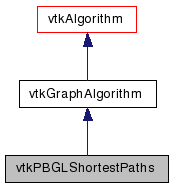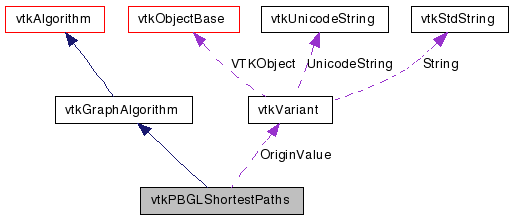vtkPBGLShortestPaths Class Reference
#include <vtkPBGLShortestPaths.h>


Detailed Description
Compute the shortest paths from the origin vertex to all other vertices in a distributed vtkGraph.This VTK class uses the Parallel BGL's implementation of the delta-stepping algorithm generic algorithm to compute shortest paths from a given 'source' vertex on the input graph (a distributed vtkGraph). Delta-stepping, discovered by Meyer and Sanders, is a parallel form of Dijkstra's shortest paths algorithm, based on a multi-level bucket structure that permits edges to be relaxed in parallel.
Definition at line 47 of file vtkPBGLShortestPaths.h.
Member Typedef Documentation
Constructor & Destructor Documentation
| vtkPBGLShortestPaths::vtkPBGLShortestPaths | ( | ) | [protected] |
| vtkPBGLShortestPaths::~vtkPBGLShortestPaths | ( | ) | [protected] |
Member Function Documentation
| static vtkPBGLShortestPaths* vtkPBGLShortestPaths::New | ( | ) | [static] |
Create an object with Debug turned off, modified time initialized to zero, and reference counting on.
Reimplemented from vtkGraphAlgorithm.
| virtual const char* vtkPBGLShortestPaths::GetClassName | ( | ) | [virtual] |
Reimplemented from vtkGraphAlgorithm.
| static int vtkPBGLShortestPaths::IsTypeOf | ( | const char * | name | ) | [static] |
Return 1 if this class type is the same type of (or a subclass of) the named class. Returns 0 otherwise. This method works in combination with vtkTypeMacro found in vtkSetGet.h.
Reimplemented from vtkGraphAlgorithm.
| virtual int vtkPBGLShortestPaths::IsA | ( | const char * | name | ) | [virtual] |
Return 1 if this class is the same type of (or a subclass of) the named class. Returns 0 otherwise. This method works in combination with vtkTypeMacro found in vtkSetGet.h.
Reimplemented from vtkGraphAlgorithm.
| static vtkPBGLShortestPaths* vtkPBGLShortestPaths::SafeDownCast | ( | vtkObject * | o | ) | [static] |
Reimplemented from vtkGraphAlgorithm.
| void vtkPBGLShortestPaths::PrintSelf | ( | ostream & | os, | |
| vtkIndent | indent | |||
| ) | [virtual] |
Methods invoked by print to print information about the object including superclasses. Typically not called by the user (use Print() instead) but used in the hierarchical print process to combine the output of several classes.
Reimplemented from vtkGraphAlgorithm.
| void vtkPBGLShortestPaths::SetOriginSelection | ( | vtkSelection * | s | ) |
Convenience methods for setting the origin selection input.
| void vtkPBGLShortestPaths::SetOriginSelectionConnection | ( | vtkAlgorithmOutput * | algOutput | ) | [inline] |
Convenience methods for setting the origin selection input.
Definition at line 57 of file vtkPBGLShortestPaths.h.
| void vtkPBGLShortestPaths::SetOriginVertex | ( | vtkIdType | index | ) |
Set the index (into the vertex array) of the breadth first search 'origin' vertex.
| void vtkPBGLShortestPaths::SetOriginVertex | ( | vtkStdString | arrayName, | |
| vtkVariant | value | |||
| ) |
Set the breadth first search 'origin' vertex. This method is basically the same as above but allows the application to simply specify an array name and value, instead of having to know the specific index of the vertex.
| void vtkPBGLShortestPaths::SetOriginVertexString | ( | char * | arrayName, | |
| char * | value | |||
| ) |
Convenience method for setting the origin vertex given an array name and string value. This method is primarily for the benefit of the VTK Parallel client/server layer, callers should prefer to use SetOriginVertex() whenever possible.
| virtual void vtkPBGLShortestPaths::SetEdgeWeightArrayName | ( | const char * | ) | [virtual] |
Set the name of the edge-weight input array, which must name an array that is part of the edge data of the input graph and contains numeric data. If the edge-weight array is not of type vtkDoubleArray, the array will be copied into a temporary vtkDoubleArray.
| virtual void vtkPBGLShortestPaths::SetDelta | ( | double | ) | [virtual] |
Sets the value of delta, which is the width of each "bucket" within the multi-level bucket structure used internally by this algorithm. Large values of delta correspond with wider buckets, exposing more parallelism than smaller values. However, values that are too large will cause the algorithm to compute (and, later, correct) paths that are longer than the shortest path. While the value of delta will not affect the correctness of the results of this algorithm, delta can have a significant impact on performance. If no value of delta is provided, this algorithm employs the heuristics provided by Meyer and Sanders to automatically determine a delta.
| virtual void vtkPBGLShortestPaths::SetPredecessorArrayName | ( | const char * | ) | [virtual] |
Set the name of the predecessor output array, which contains the predecessor of each vertex within the shortest paths tree. To determine the shortest path from the origin to a particular vertex, walk the predecessor array backwards. If no predecessor array name is set then the name 'Predecessor' is used.
| virtual void vtkPBGLShortestPaths::SetPathLengthArrayName | ( | const char * | ) | [virtual] |
Set the name of the shortest path length output array, containing the length of the shortest path from the origin vertex to each of the other vertices in the graph. The origin will always have path-length 0, while vertices unreachable from the origin will have infinite path-length. If no path length array name is set then the name 'PathLength' is used.
| virtual void vtkPBGLShortestPaths::SetOriginFromSelection | ( | bool | ) | [virtual] |
Use the vtkSelection from input port 1 as the origin vertex. The selection should be a IDS selection with field type POINTS. The first ID in the selection will be used for the origin vertex. Default is off (origin is specified by SetOriginVertex(...)).
| virtual bool vtkPBGLShortestPaths::GetOriginFromSelection | ( | ) | [virtual] |
Use the vtkSelection from input port 1 as the origin vertex. The selection should be a IDS selection with field type POINTS. The first ID in the selection will be used for the origin vertex. Default is off (origin is specified by SetOriginVertex(...)).
| virtual void vtkPBGLShortestPaths::OriginFromSelectionOn | ( | ) | [virtual] |
Use the vtkSelection from input port 1 as the origin vertex. The selection should be a IDS selection with field type POINTS. The first ID in the selection will be used for the origin vertex. Default is off (origin is specified by SetOriginVertex(...)).
| virtual void vtkPBGLShortestPaths::OriginFromSelectionOff | ( | ) | [virtual] |
Use the vtkSelection from input port 1 as the origin vertex. The selection should be a IDS selection with field type POINTS. The first ID in the selection will be used for the origin vertex. Default is off (origin is specified by SetOriginVertex(...)).
| virtual bool vtkPBGLShortestPaths::GetOutputSelection | ( | ) | [virtual] |
Create an output selection containing the ID of a vertex based on the output selection type. The default is to use the the maximum distance from the starting vertex. Defaults to off.
| virtual void vtkPBGLShortestPaths::SetOutputSelection | ( | bool | ) | [virtual] |
Create an output selection containing the ID of a vertex based on the output selection type. The default is to use the the maximum distance from the starting vertex. Defaults to off.
| virtual void vtkPBGLShortestPaths::OutputSelectionOn | ( | ) | [virtual] |
Create an output selection containing the ID of a vertex based on the output selection type. The default is to use the the maximum distance from the starting vertex. Defaults to off.
| virtual void vtkPBGLShortestPaths::OutputSelectionOff | ( | ) | [virtual] |
Create an output selection containing the ID of a vertex based on the output selection type. The default is to use the the maximum distance from the starting vertex. Defaults to off.
| virtual void vtkPBGLShortestPaths::SetOutputSelectionType | ( | const char * | ) | [virtual] |
Set the output selection type. The default is to use the the maximum distance from the starting vertex "MAX_DIST_FROM_ROOT". But you can also specify other things like "ROOT","2D_MAX", etc
| virtual void vtkPBGLShortestPaths::SetUseUniformEdgeWeights | ( | bool | ) | [virtual] |
This option causes a temporary edge-weight array to be created with uniform edge weights of 1.0 at each edge. This option should preempt a given edge weight array via EdgeWeightArrayName. Defaults to off.
| virtual bool vtkPBGLShortestPaths::GetUseUniformEdgeWeights | ( | ) | [virtual] |
This option causes a temporary edge-weight array to be created with uniform edge weights of 1.0 at each edge. This option should preempt a given edge weight array via EdgeWeightArrayName. Defaults to off.
| virtual void vtkPBGLShortestPaths::UseUniformEdgeWeightsOn | ( | ) | [virtual] |
This option causes a temporary edge-weight array to be created with uniform edge weights of 1.0 at each edge. This option should preempt a given edge weight array via EdgeWeightArrayName. Defaults to off.
| virtual void vtkPBGLShortestPaths::UseUniformEdgeWeightsOff | ( | ) | [virtual] |
This option causes a temporary edge-weight array to be created with uniform edge weights of 1.0 at each edge. This option should preempt a given edge weight array via EdgeWeightArrayName. Defaults to off.
| virtual int vtkPBGLShortestPaths::RequestData | ( | vtkInformation * | request, | |
| vtkInformationVector ** | inputVector, | |||
| vtkInformationVector * | outputVector | |||
| ) | [protected, virtual] |
This is called by the superclass. This is the method you should override.
Reimplemented from vtkGraphAlgorithm.
| virtual int vtkPBGLShortestPaths::FillInputPortInformation | ( | int | port, | |
| vtkInformation * | info | |||
| ) | [protected, virtual] |
Fill the input port information objects for this algorithm. This is invoked by the first call to GetInputPortInformation for each port so subclasses can specify what they can handle.
Reimplemented from vtkGraphAlgorithm.
| virtual int vtkPBGLShortestPaths::FillOutputPortInformation | ( | int | port, | |
| vtkInformation * | info | |||
| ) | [protected, virtual] |
Fill the output port information objects for this algorithm. This is invoked by the first call to GetOutputPortInformation for each port so subclasses can specify what they can handle.
Reimplemented from vtkGraphAlgorithm.
The documentation for this class was generated from the following file:
- dox/Parallel/vtkPBGLShortestPaths.h
 1.5.6
1.5.6